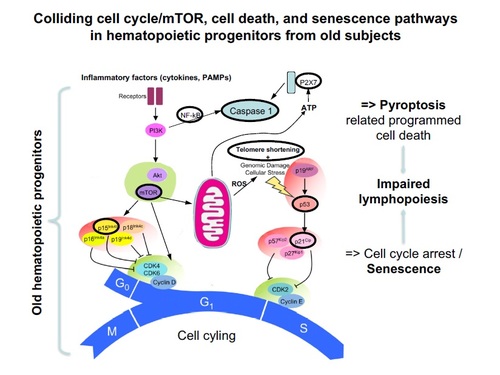- HOME
- News & Events
- Publications
- 【Publications】Elderly human hematopoietic progenitor cells express cellular senescence markers and a...
Publications
【Publications】Elderly human hematopoietic progenitor cells express cellular senescence markers and are more susceptible to pyroptosis
July 13 2018
Victor APPAY
Paper information
Tinhinane Fali, Véronique Fabre-Mersseman, Takuya Yamamoto, Charles Bayard, Laura Papagno, Solène Fastenackels, Rima Zoorob, Richard A. Koup, Jacques Boddaert, Delphine Sauce and Victor Appay
JCI Insight. 2018;3(13):e95319. https://doi.org/10.1172/jci.insight.95319.
Highlights
This work provides new insights underlying the alterations of hematopoietic progenitors in old humans, including:
• Old HPC are metabolically active and pressed to proliferate and enter cell cycling. They display oxidative phosphorylation, associated with an activated mTOR pathway and mitochondrial stress.
• However, old HPC appear to be blocked at early cell cycle stages, in line with mechanisms of cellular senescence at play in these cells, related to telomere attrition and the induction of the p53 and p15 pathways.
• Last, old HPC are prone to pyroptosis, an inflammatory form of programmed cell death, impacting cell survival and differentiation.
Abstract
The maintenance of effective immunity over time is dependent on the capacity of hematopoietic stem cells (HSC) to sustain the pool of immunocompetent mature cells. Decline of immune competence with old age may stem from HSC defects, including reduced self-renewal potential and impaired lymphopoiesis, as suggested in murine models. To get further insights into aging related alteration of hematopoiesis, we performed a comprehensive study of blood hematopoietic progenitor cells (HPC) from old humans. In the elderly, HPC present active oxidative phosphorylation and are pressed to enter cell cycling. However, p53-p21 and p15 cell senescence pathways, associated with telomerase activity deficiency, strong telomere attrition and oxidative stress, are engaged, thus limiting cell cycling. Moreover, survival of old HPC is impacted by pyroptosis, an inflammatory form of programmed cell death. Last, telomerase activity deficiency and telomere length attrition of old HPC may be passed on progeny cells such as naïve T lymphocytes, highlighting further the poor hematopoietic potential of the elderly. This pre-senescent profile is characteristic of the multiple intrinsic and extrinsic factors affecting HPC in old individuals and represents a major obstacle in terms of immune reconstitution and efficacy with advanced age.

